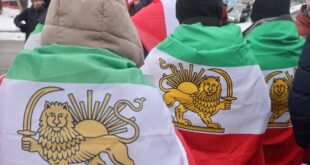 MUSCAT (AP) — Thousands of people fled low-lying areas Tuesday as the strongest cyclone to threaten the Arabian Peninsula in 60 years barrelled towards the oil-rich Persian Gulf — with southern Iran next in its path.
MUSCAT (AP) — Thousands of people fled low-lying areas Tuesday as the strongest cyclone to threaten the Arabian Peninsula in 60 years barrelled towards the oil-rich Persian Gulf — with southern Iran next in its path.
Cyclone Gonu was expected to skirt the region’s biggest oil installations but could disrupt shipping through the Straits of Hormuz, causing a spike in prices, oil analysts said.
Oil prices rose on Monday but retreated Tuesday, though the storm weighed heavily on the market.
“If the storm hits Iran, it’s a much bigger story than Oman, given how much bigger an oil producer Iran is,” said Antoine Haff of FIMAT USA, a brokerage unit of Societe Generale. “At a minimum, it’s likely to affect tanker traffic and to shut down some Omani oil production as a precautionary measure,” Haff said.
Late Tuesday, Cyclone Gonu, packing winds up to 193 kilometres per hour and gusts up to 241 kilometres per hour, was churning northwest through the Indian Ocean, according to AccuWeather.com meteorologist Donn Washburn. Rain from its outer edges was already reaching coastal areas of Oman, though the storm was weakening as it roared through an area with shallower water and drier air.
The core of the Cyclone Gonu was predicted to skirt easternmost Oman and head to the Gulf of Oman, but heavy rains and strong winds were forecast over the country to its capital, Muscat, Washburn said. The cyclone was expected to hit land in southeastern Iran late Wednesday or early Thursday, Washburn said.
The Joint Typhoon Warning Centre, a US military task force that tracks storms in the Pacific and Indian Oceans, predicted rough seas within the Straits of Hormuz, the transport route for two-fifths of the world’s oil and the southern entrance to the Gulf.
The centre predicted the storm would churn up waves of up to 11 metres.
In Tehran, the government’s department of meteorology predicted heavy rains and strong winds along Iran’s southeastern coast. Storm warnings had been issued and some damage was expected, the department said.
As the giant storm approached, authorities evacuated nearly 7,000 people from Masirah, a lowland island off the east coast of Oman, according to Gen. Malik Ben Suleiman Muamri, head of the country’s civil defence.
Oman’s main international airport in Muscat was also closed.
Masirah Island includes one of four air bases which the Omani government allows the US military to use for refuelling, logistics and storage, though little has been revealed publicly about US-Oman military ties.
The Masirah base hosted US B-1B bombers, C-130 transports and US Special Forces AC-130 gunships during the war in Afghanistan and the United States has continued to have basing rights on the island.
US forces are preparing for Gonu “just like anyone would prepare for such a cyclone,” said Lt. Denise Garcia, a spokeswoman for US Naval Forces Central Command, which is based in Bahrain. She declined to provide more details.
She said US navy ships in the Arabian Gulf and elsewhere in the region were also taking precautions to avoid Gonu, but there was no major overhaul of operations.
The US military has offered its assistance to Oman, but so far, Omani authorities have not requested help, she said.
On Masirah, authorities said a state of emergency had been declared. Troops and police were mobilised to help provide shelter and medical services.
More families were also leaving their homes Tuesday on the mainland, officials said. The government said schools and public building were emptied to make room for the evacuees.
Oman’s major oil installations, which were not directly in the projected path and nowhere near as extensive as those of its neighbors, continued operations but took precautions as Gonu approached.
In neighbouring Saudi Arabia, the government said the country and oil markets would not be seriously affected by the storm.
But some oil analysts said the storm could have a damaging effect on the oil market.
Manouchehr Takin, an analyst at the Centre for Global Energy Studies in London, said the real fear is that the loading of tankers might be delayed by the storm.
“About 17-21 million barrels a day of oil are coming out of the Persian Gulf. Even if only some of the tankers are delayed that could reduce the supply of oil and increase prices,” Takin said.
Even with the weaker wind speeds, Gonu, which means a bag made of palm leaves in the language of the Maldives, is expected to be the strongest cyclone to hit the Arabian Peninsula since record keeping started in 1945.
A cyclone is the term used for hurricanes in the Indian Ocean and Western Pacific.
 Eurasia Press & News
Eurasia Press & News



